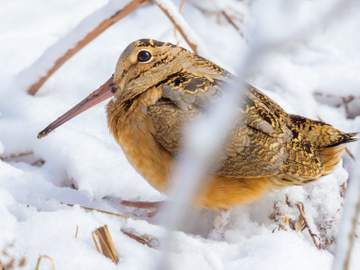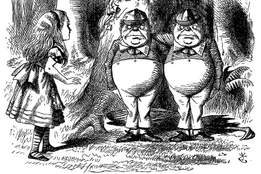
‘Conclave’
Conclave was a top lookup this week following the death of Pope Francis.
The Catholic Church follows a centuries-old process to elect a new pope, known as the papal conclave, which occurs after a pope dies or resigns. Following the death of Pope Francis at age 88, the Catholic Church must now begin the process of electing a new leader.
—Jenna deJong, Newsweek, 21 Apr. 2025
We define the relevant sense of conclave as “a meeting of Roman Catholic cardinals secluded continuously while choosing a pope.” Conclave comes from a Latin word meaning “room that can be locked up” (from the Latin com-, “together,” and clavis, “key”). The English conclave formerly had the same meaning, but that use is now obsolete.
‘Camerlengo’
Camerlengo also appeared prominently in the news about Pope Francis’s death, leading to a rise in lookups for the word.
The camerlengo, who runs the Vatican from the moment a pope dies until the election of a successor, removes the papal ring from his finger. Known as the fisherman’s ring because it depicts St. Peter fishing from a boat, the papal ring is traditionally used to seal Vatican documents. It carries the pope’s name and is destroyed after his death. A new one is forged when the next pope is elected.
—Gaia Pianigiani, The New York Times, 21 Apr. 2025
We define camerlengo as “a cardinal who is appointed by the pope and charged with specific duties (such as certifying the pope's death and preparing a conclave) during a papal interregnum.”
‘Humility’
Humility also became a top lookup in connection with the passing of Pope Francis.
The boy who would become Pope Francis was born as Jorge Mario Bergoglio in Buenos Aires on Dec. 17, 1936. Bookish, intelligent and deeply religious, he also played basketball and loved to dance the tango. ... Bergoglio was ordained as a Jesuit priest in 1969. The Jesuit tradition emphasizes humility, helping the poor and respecting Indigenous peoples. As he rose through the ranks to become a cardinal, he practiced that humility: He cooked for himself and took the bus to work from his apartment.
—Lauren Jackson and Claire Fahy, The New York Times, 21 Apr. 2025
We define humility as “freedom from pride or arrogance; the quality or state of being humble.”
‘Stymie’
Lookups for the verb stymie were high early in the week after President Trump used it in a social media post.
The president took to Truth Social to vent after the nine justices voted 7-2 over the weekend to block Trump’s deportation of Venezuelan immigrants under the 1798 Alien Enemies Act without due process. “My team is fantastic, doing an incredible job, however, they are being stymied at every turn by even the U.S. Supreme Court ...” Trump posted.
—Hafiz Rashid, The New Republic, 22 Apr. 2025
To stymie something or someone is to present them with an obstacle, or in other words, to stand in their way. Stymie entered English from Scots in the 19th century as a noun referring to a golfing situation in which one player’s ball lies between another ball and the hole on the putting green, thereby blocking the line of play. Later, stymie came to be used as a verb meaning “to bring into the position of, or impede by, a stymie.” By the early 20th century, the verb was being applied in similarly vexing non-golf contexts.
‘Exoplanet’
Exoplanet has seen a rise in lookups recently due to discoveries involving planets that revolve around distant stars.
Astronomers have discovered a doomed, disintegrating planet with a comet-like tail that is shedding a Mount Everest’s worth of material each time it orbits its star. The small, rocky world—given the catchy name BD+05 4868 Ab—lies some 140 light-years from Earth in the constellation of Pegasus. ... Tails are rare amid the 6,000-odd exoplanets discovered to date—BD+05 4868 Ab is only the fourth example ever found. It also has the longest tail and the strongest signal of the four.
—Ian Randall, Newsweek, 22 Apr. 2025
A strong possibility exists that extraterrestrial life can be found on a distant exoplanet known as K2-18b. Using observations from NASA’s James Webb Space Telescope, the researchers were able to find possible hints of molecules and gases that, on Earth, are signs of life. If anything is indeed living on the planet, it likely would be microorganisms akin to Earth’s phytoplankton.
—Eric Lagatta and Jalen Williams, The Detroit Free Press, 21 Apr. 2025
We define exoplanet as “a planet orbiting a star that is not our sun.” The first-known use in print of exoplanet appeared in 1992, putting the word in the company of other lexical luminaries such as skeezy, man cave, and MacGyver.
Word Worth Knowing: ‘Bogsucker’
You know how the old song goes: “American woodcock / stay away from me / American woodcock / Mama let me be…” Just kidding of course, and besides—woodcocks are a delight to have around, from their goofy little struts (possibly to stir tasty worms below ground into revealing their presence) to their beautiful mating flight dances. We should all celebrate woodcocks, delight in woodcocks, sound our barbaric yawps over the roofs of the world about woodcocks—which is why it’s a bit odd, if amusing, that they are sometimes referred by the bluntest of sobriquets, bogsucker. At least if you don’t like bogsucker or even woodcock you’ve got a raft of other options (we are charmed in particular by timberdoodle and night-flit) ...
... Pettingill writes that the woodcock has at least thirty-nine vernacular names, including (hold your breath) snipe, cock, little woodcock, less woodcock, timberdoodle, big-headed snipe, mud snipe, red-breasted snipe, blind snipe, big mud snipe, wood snipe, big snipe, brush snipe, thick-necked snipe, wall-eyed snipe, cane snipe, owl snipe, bar-capped snipe, whistling snipe, little whistler, whistler, Labrador twister, pewee, hill partridge, night-flit, night peck, woodhen, mudhen, bog sucker, bog bird, bog borer, marsh plover, holumpake, shrups, night becasse, and Massachusetts woodcock. He goes on to the list the names of the woodcock in Pennsylvania German, Chippewa, Canadian French, Creole, and German. Needless to say, there’s a lot of confusion around this bird.
— Greg Hoch, Sky Dance of the Woodcock: The Habits and Habitats of a Strange Little Bird, 2019




